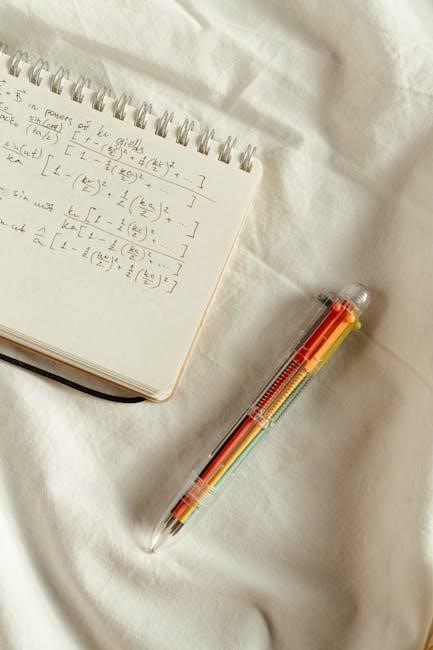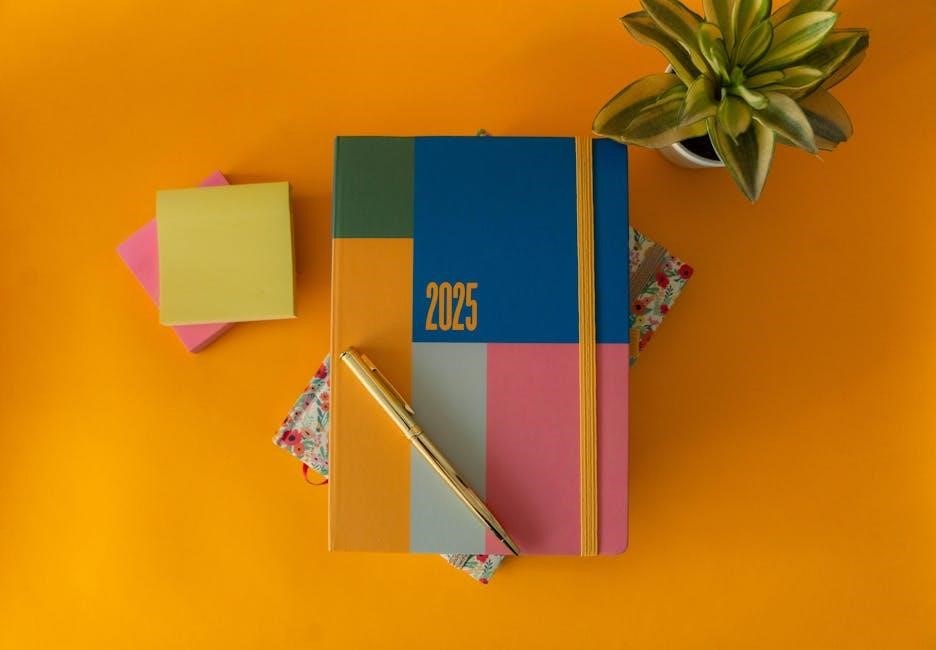
year 6 algebra worksheets pdf
Year 6 algebra worksheets are essential resources for students transitioning from arithmetic to algebraic thinking. They cover algebraic expressions‚ equations‚ and number sequences‚ fostering problem-solving skills and logical reasoning. These worksheets are designed to be engaging and accessible‚ helping students build a strong foundation for higher-level math. With a focus on linear sequences‚ balancing equations‚ and real-world applications‚ they provide comprehensive practice for Year 6 pupils.
1.1 What Are Year 6 Algebra Worksheets?
Year 6 algebra worksheets are structured resources designed to help students master foundational algebraic concepts. They include exercises on expressing patterns‚ solving equations‚ and generating expressions. These worksheets are tailored for Year 6 pupils‚ offering a comprehensive way to practice and understand algebraic principles through various engaging activities and problems.
1.2 Importance of Algebra in Year 6 Curriculum
Algebra is fundamental in Year 6‚ introducing variables and equations. It enhances problem-solving skills‚ logical thinking‚ and analytical reasoning. These concepts are crucial for STEM fields and future academic success. Mastering algebra at this stage builds a strong foundation for more complex mathematics in higher grades.
Key Topics Covered in Year 6 Algebra Worksheets
Year 6 algebra worksheets cover patterns‚ equations‚ and expressions. Students learn to identify sequences‚ balance equations‚ and simplify expressions‚ building foundational algebraic skills for problem-solving and logical reasoning.
2.1 Expressing Patterns and Linear Sequences
Year 6 worksheets focus on identifying and extending patterns‚ including linear sequences. Students learn to describe patterns using algebraic expressions and predict the next terms. Activities involve generating sequences with constant differences‚ enhancing their understanding of relationships between terms and developing mathematical reasoning skills through structured practice exercises.
2.2 Balancing Equations and Solving Simple Equations
Year 6 algebra worksheets emphasize balancing equations and solving simple equations using inverse operations. Students learn to manipulate equations like (3a = 12) or (10 ⎼ x = 5)‚ ensuring both sides remain equal. These exercises build foundational problem-solving skills‚ preparing pupils for more complex algebraic concepts in higher grades.
2.3 Generating and Calculating Algebraic Expressions
Year 6 algebra worksheets focus on generating and calculating algebraic expressions‚ such as 2a + 5 or 5(y² ⎼ 6). Students learn to simplify expressions‚ combine like terms‚ and substitute values‚ enhancing their ability to manipulate and solve algebraic problems confidently. These exercises are key to developing foundational algebraic skills for future math studies.

Types of Year 6 Algebra Worksheets
Year 6 algebra worksheets come in various formats‚ including printable PDFs‚ interactive digital versions‚ and self-assessment sheets with answers‚ catering to different learning preferences and needs.
3.1 Printable PDF Worksheets
Printable PDF worksheets for Year 6 algebra are versatile and convenient‚ offering a range of topics like algebraic expressions‚ equations‚ and number sequences. They often feature colorful designs‚ step-by-step examples‚ and varied difficulty levels to engage students. Many resources‚ such as those from Cazoom Maths‚ provide comprehensive practice and include quizzes for self-assessment‚ making them ideal for home or classroom use.
3.2 Interactive Digital Worksheets
Interactive digital worksheets for Year 6 algebra are engaging tools that offer real-time feedback and immersive learning experiences. They often include quizzes‚ games‚ and simulations‚ making algebraic concepts like equations and sequences more dynamic. Platforms provide immediate scoring‚ helping students track progress and identify areas for improvement‚ while keeping learning fun and interactive.
3.3 Worksheets with Answers for Self-Assessment
Worksheets with answers enable students to evaluate their understanding independently. These resources include correct solutions‚ allowing pupils to identify mistakes and improve; They are ideal for self-study‚ revision‚ and building confidence. Many Year 6 algebra PDFs offer answer keys‚ making them valuable tools for reinforcing concepts and tracking progress effectively.

Benefits of Using Year 6 Algebra Worksheets
Year 6 algebra worksheets reinforce algebraic concepts‚ develop problem-solving skills‚ and prepare students for exams like SATs. They also build confidence‚ encourage independent learning‚ and provide immediate feedback through answers.
4.1 Reinforcing Algebraic Concepts
Year 6 algebra worksheets help students grasp fundamental algebraic ideas‚ such as expressing patterns‚ balancing equations‚ and solving simple equations. They provide structured exercises that reinforce concepts like linear sequences‚ algebraic expressions‚ and formula substitution‚ ensuring a solid understanding of algebraic principles through varied and engaging practice opportunities.
4.2 Developing Problem-Solving Skills
Year 6 algebra worksheets are designed to enhance problem-solving abilities by presenting students with various algebraic challenges. These exercises encourage critical thinking and logical reasoning‚ helping pupils apply mathematical concepts to solve equations‚ number sequences‚ and word problems. Regular practice fosters confidence and proficiency in tackling algebraic problems effectively and systematically.
4.4 Preparing for SATs and Other Exams
Year 6 algebra worksheets are invaluable for exam preparation‚ offering SATs-style questions and timed practice exercises. They help students familiarize themselves with exam formats‚ focus on key topics like equations and sequences‚ and build confidence in tackling algebraic problems under timed conditions‚ ensuring readiness for assessments and other standardized tests.
Where to Find Year 6 Algebra Worksheets
Year 6 algebra worksheets are widely available on educational websites‚ offering free PDF downloads and interactive options. Schools and teachers also provide tailored materials for student practice and review.
5.1 Free Resources and Websites
Free Year 6 algebra worksheets are available on educational websites like Cazoom Maths and Math Drills. These platforms offer downloadable PDFs covering algebraic expressions‚ equations‚ and number sequences. They are ideal for home practice or classroom use‚ providing a variety of challenges to suit different learning needs and styles.
5.2 Paid Resources and Educational Platforms
Paid resources like Cazoom Maths offer detailed Year 6 algebra worksheet packs with step-by-step guides and interactive tools. These platforms provide comprehensive practice materials‚ including algebraic expressions‚ equations‚ and sequences‚ designed to help students master algebra concepts. They are ideal for teachers and parents seeking structured‚ high-quality learning resources.
5.3 School and Teacher-Provided Materials
Schools and teachers often provide customised algebra worksheets tailored to Year 6 students’ needs. These materials are designed to align with curriculum goals‚ offering structured practice in algebraic expressions‚ equations‚ and sequences. Teachers may also create differentiated resources to cater to various learning styles and abilities‚ ensuring all students can progress effectively. These materials are invaluable for targeted practice and reinforcement of key concepts. Many educational platforms offer additional resources specifically designed for schools‚ further enriching the learning experience.

How to Use Year 6 Algebra Worksheets Effectively
Incorporate worksheets into lesson plans for structured practice‚ encourage independent study‚ and use them for revision. They help build confidence and fluency in algebraic concepts through engaging designs and progressive difficulty.
6.1 Incorporating Worksheets into Lesson Plans
Begin by introducing algebra concepts with step-by-step examples‚ then assign worksheets for independent practice. Use them as formative assessments to monitor progress and adjust teaching strategies. This structured approach ensures students grasp algebraic expressions‚ equations‚ and patterns effectively‚ building confidence and fluency in math skills.
6.2 Encouraging Independent Practice
Encourage students to use Year 6 algebra worksheets independently to reinforce learning. Provide access to self-assessment tools‚ allowing pupils to check answers and track progress. This fosters a sense of ownership and confidence‚ enabling them to practice consistently and master algebraic concepts at their own pace.
6.3 Using Worksheets for Revision and Assessment
Worksheets are valuable for revising and assessing algebra skills in Year 6; They offer a structured way to review key topics like equations and sequences. Regular use helps identify strengths and areas needing improvement‚ ensuring pupils are well-prepared for exams and confident in their algebraic abilities.
Common Features of Year 6 Algebra Worksheets
Year 6 algebra worksheets often include step-by-step instructions‚ colourful designs‚ and varied difficulty levels. They feature clear examples‚ engaging layouts‚ and interactive elements to make learning algebra fun and accessible for students.
7.1 Step-by-Step Instructions and Examples
Year 6 algebra worksheets provide clear‚ step-by-step instructions and examples to guide students through complex concepts. These resources often include visual aids and breakdowns of problems‚ ensuring students understand each stage of solving equations‚ patterns‚ and expressions. Detailed examples help pupils grasp algebraic principles‚ making learning more accessible and engaging for all skill levels.
7.2 Colourful and Engaging Designs
Year 6 algebra worksheets often feature vibrant‚ colourful designs to captivate young learners. Bright visuals and engaging layouts make algebra more appealing‚ helping students stay focused and motivated. These designs incorporate illustrations‚ charts‚ and diagrams to simplify complex concepts‚ ensuring an enjoyable and interactive learning experience for Year 6 pupils.
7.3 Varied Difficulty Levels
Year 6 algebra worksheets offer problems that start simple and gradually increase in complexity. This approach helps students build confidence and skills progressively. The varied difficulty levels support different learning paces‚ allowing teachers to cater to the needs of all students effectively‚ ensuring that each learner is appropriately challenged.

Examples of Year 6 Algebra Worksheets
Examples include solving equations‚ number sequences‚ and word problems. Worksheets cover topics like forming expressions‚ function machines‚ and real-world applications‚ helping students apply algebraic concepts practically.
8.1 Solving Equations and Formulas
Solving equations and formulas is a core component of Year 6 algebra worksheets. Students practice substituting values‚ simplifying expressions‚ and solving for unknowns using basic algebraic operations. Worksheets include one-step equations‚ word problems‚ and real-world scenarios‚ helping pupils master essential problem-solving skills and logical thinking. These exercises build confidence in manipulating algebraic expressions effectively.
8.2 Number Sequences and Patterns
Number sequences and patterns are fundamental in Year 6 algebra worksheets. Students identify and generate linear sequences‚ determining missing terms and understanding rules. Activities include describing patterns‚ creating formulas‚ and predicting future terms. These exercises enhance algebraic thinking and problem-solving skills‚ preparing pupils for more complex mathematical concepts in later years.
8.4 Word Problems and Real-World Applications
Word problems and real-world applications in Year 6 algebra worksheets help students connect abstract concepts to everyday scenarios. Examples include calculating ages‚ budgeting‚ and measuring quantities. These problems enhance critical thinking and practical application of algebraic skills‚ making learning relevant and engaging for pupils. They also prepare students for real-life problem-solving challenges.
Tips for Parents and Teachers
Encourage daily practice with algebra worksheets‚ provide constructive feedback‚ and use visual aids to simplify complex concepts. Create a supportive learning environment to foster confidence and understanding in students.
9.1 Supporting Students with Algebra at Home
Parents can support Year 6 students by creating a structured study environment and using algebra worksheets to reinforce classroom learning. Encourage daily practice‚ discuss problem-solving strategies‚ and provide guidance without doing the work for them. Celebrate progress and maintain open communication with teachers to address any challenges promptly and effectively.
9.2 Differentiating Instruction for Diverse Learners
Year 6 algebra worksheets offer resources to adapt to diverse learning needs. Printable and digital formats cater to different preferences‚ while varied difficulty levels and self-assessment tools help personalize learning. These resources aid teachers in providing tailored instruction‚ ensuring each student’s unique needs are met effectively.
9.3 Providing Feedback and Encouragement
Providing constructive feedback and encouragement is crucial for students learning algebra. Year 6 algebra worksheets with answers enable immediate self-assessment‚ while online tools offer instant feedback. Celebrating progress‚ no matter how small‚ builds confidence and motivates students to tackle challenging problems. Positive reinforcement helps foster a growth mindset and love for learning algebra.
The Role of Technology in Year 6 Algebra Learning
Technology enhances Year 6 algebra learning through interactive tools‚ apps‚ and digital worksheets. It provides immediate feedback‚ engages students with games‚ and offers personalized practice to reinforce algebraic concepts effectively.
10.1 Online Tools and Apps for Algebra Practice
Online tools and apps provide interactive platforms for Year 6 students to practice algebra. They offer engaging activities‚ games‚ and quizzes with immediate feedback‚ helping students grasp algebraic concepts through personalized and fun learning experiences.
10.2 Interactive Games and Simulations
Interactive games and simulations make algebra practice engaging and fun for Year 6 students. They transform abstract concepts into tangible‚ visual experiences‚ allowing students to explore algebraic relationships dynamically. These tools cater to different learning styles‚ enhancing understanding and confidence through hands-on problem-solving and real-time feedback.
10.3 Digital Worksheets and Quizzes
Digital worksheets and quizzes offer interactive ways for Year 6 students to practice algebra. They provide immediate feedback‚ track progress‚ and cater to different learning paces. Many resources include self-assessment features‚ allowing students to identify strengths and areas for improvement‚ making them ideal for both independent practice and classroom use.
Assessing Progress with Year 6 Algebra Worksheets
Year 6 algebra worksheets enable teachers and parents to monitor students’ progress effectively. They help identify areas needing improvement and track skill development over time‚ fostering confidence and understanding through measurable growth.
11.1 Tracking Improvement Over Time
Regular use of Year 6 algebra worksheets allows for consistent progress tracking. Students’ scores and accuracy improve as they practice solving equations and sequences. Over time‚ this visible growth builds confidence and highlights mastery of algebraic concepts‚ preparing them for more complex math challenges ahead.
11.2 Identifying Areas for Further Practice
Year 6 algebra worksheets help pinpoint areas where students may need extra support. By reviewing incorrect answers‚ teachers and parents can identify patterns in mistakes‚ such as struggling with solving equations or number sequences. Targeted practice on these topics ensures tailored learning and improved understanding of algebraic concepts. Worksheets with answers facilitate this process.
11.3 Celebrating Achievements and Building Confidence
Celebrating achievements‚ no matter how small‚ helps Year 6 students build confidence in algebra. Recognizing progress through correct answers or improved scores motivates learners. Interactive tools and visual rewards make celebrations engaging‚ fostering a positive mindset and encouraging students to tackle more challenging algebraic problems with enthusiasm and determination.
Year 6 algebra worksheets are invaluable for developing foundational math skills. They provide structured practice‚ enhance problem-solving abilities‚ and prepare students for future academic challenges in algebra and beyond.
12.1 Final Thoughts on Year 6 Algebra Worksheets
Year 6 algebra worksheets are crucial for building foundational algebra skills‚ aiding the transition from arithmetic to algebraic thinking. They cover linear sequences‚ equations‚ and expressions‚ fostering problem-solving abilities. Engaging designs and varied difficulty levels ensure accessibility‚ making them an invaluable resource for teachers and parents preparing students for advanced math.
12.2 Encouraging a Growth Mindset in Algebra
Year 6 algebra worksheets foster a growth mindset by encouraging persistence and resilience. They help students view challenges as opportunities to learn‚ embracing mistakes as stepping stones to understanding. Interactive activities and real-world applications inspire confidence‚ while parental and teacher support reinforce the idea that effort leads to mastery in algebra.
Leave a Reply
You must be logged in to post a comment.